 Petzlover
Petzlover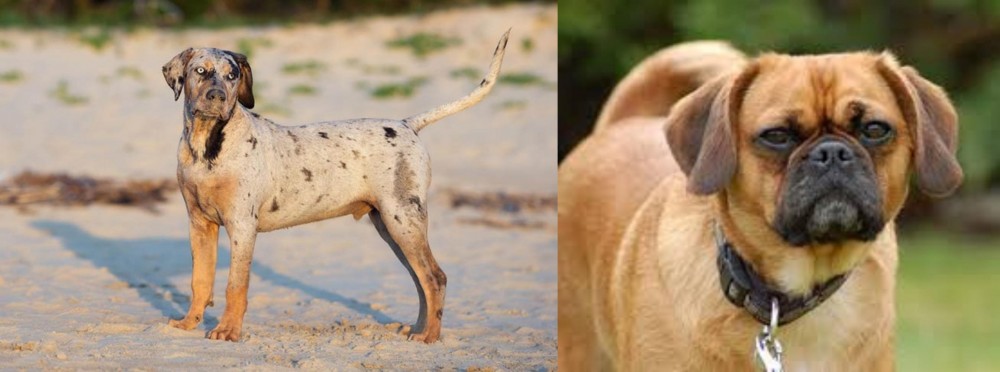 Both Catahoula Cur and Pugalier are originated from United States. Catahoula Cur may grow 36 cm / 15 inches higher than Pugalier. Catahoula Cur may weigh 38 kg / 84 pounds more than Pugalier. Both Catahoula Cur and Pugalier has almost same life span. Catahoula Cur may have more litter size than Pugalier. Both Catahoula Cur and Pugalier requires Low Maintenance.
Both Catahoula Cur and Pugalier are originated from United States. Catahoula Cur may grow 36 cm / 15 inches higher than Pugalier. Catahoula Cur may weigh 38 kg / 84 pounds more than Pugalier. Both Catahoula Cur and Pugalier has almost same life span. Catahoula Cur may have more litter size than Pugalier. Both Catahoula Cur and Pugalier requires Low Maintenance.
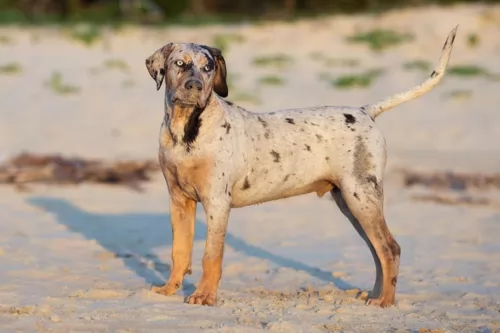 The Catahoula Cur is also known as the Catahoula Leopard Dog or the Louisiana Catahoula. The dog hails from Louisiana, United States.
The Catahoula Cur is also known as the Catahoula Leopard Dog or the Louisiana Catahoula. The dog hails from Louisiana, United States.
It is thought that the Catahoula Cur or Catahoula Hound as it is also known, used to be a hunting dog. The first settlers in Louisiana needed a strong dog to help them with hunting wild hogs and they bred their dogs with other dogs belonging to the locals. This gave them a strong, resilient dog that could take on the wild hogs and also protect their livestock.
Dogs who have no doubt been brought into the mix to produce the Catahoula Cur are mastiffs, Beaucerons, sighthounds and wolves.They are today more commonly referred to as Catahoula Leopard Dogs.
 The Pugalier is a designer dog which dates to the 1980s and 1990s. Being a fairly new dog breed, it doesn’t have a long or detailed history.
The Pugalier is a designer dog which dates to the 1980s and 1990s. Being a fairly new dog breed, it doesn’t have a long or detailed history.
It is thought that they were first bred in the United States. There was a purpose behind the crossing of the Pug and the Cavalier King Charles Spaniel. Dog enthusiasts were looking for a dog that would have less breathing problems with a longer nose.
There are a few dog breed registries that recognize the Pugalier as a designer dog breed, one of which is the American Canine Hybrid Club.
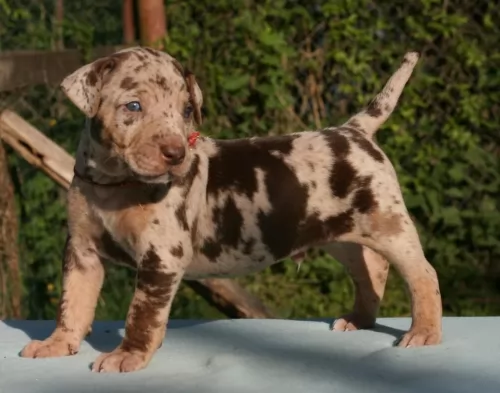 There are varying sizes for Catahoulas and a typical height is 51–66cm and weighing anything from 18 – 51kg. These Cathoula Cur’s come in different colors too, but the leopard-like coat is a dominant feature with this dog.
There are varying sizes for Catahoulas and a typical height is 51–66cm and weighing anything from 18 – 51kg. These Cathoula Cur’s come in different colors too, but the leopard-like coat is a dominant feature with this dog.
While there are solid colors, you can expect red- and blue merle, grey-, black, patchwork and brindle too.
The length of the coat varies somewhat too and while the coat is essentially short and smooth, there are Catahoulas where the coat is a little longer and more coarse.
The eyes of the Catahoula Cur are another interesting feature and both eyes can be the same color, but in some instances the one eye can be brown while the other could be blue, green or gray. The ears of the Catahoula Cur are medium in size and are floppy, dropping down close to the head.
The Catahoula Cur is an intelligent dog and also active and full of sports. You can’t call this dog aggressive, but merely assertive, being strong-willed. He is also affectionate and loyal, loving to spend time with his human family.
He makes a wonderful family pet, complete with children as well as other pets in the home, more so when he has been trained and socialized. These dogs are bright and alert and they also make excellent watch dogs. People who have owned a Catahoula Cur will tell you that these are wonderful pets, full of life and personality.
 The Pugalier looks fairly similar to a pug but with a slightly longer nose and longer ears. The tail isn’t as coifed as with the Pug, but is longer and straighter, sometimes curling slightly over the back.
The Pugalier looks fairly similar to a pug but with a slightly longer nose and longer ears. The tail isn’t as coifed as with the Pug, but is longer and straighter, sometimes curling slightly over the back.
As with any crossbreed, the dog’s appearance can vary between the two dogs. They can be small to medium sized, usually standing at between 30 and 35cm in height and weigh between 6-10kg.
Pugaliers mostly have a fairly short coat but there are some which have longer hair because of the Cavalier's influence. The coat can be an apricot color, white, brown or even tri-color - white, black & tan.
Friendly, social ad loving, the Pugalier makes a splendid pet. He will easily adapt to life in the city or the countryside and he also gets along well with children and other dogs. They can also be amusing and entertaining, while being intelligent too.
You’ll find your Pugalier easy to train as he is intelligent and then he becomes a splendid pet with training and socialization, being obedient and well mannered wherever he is.
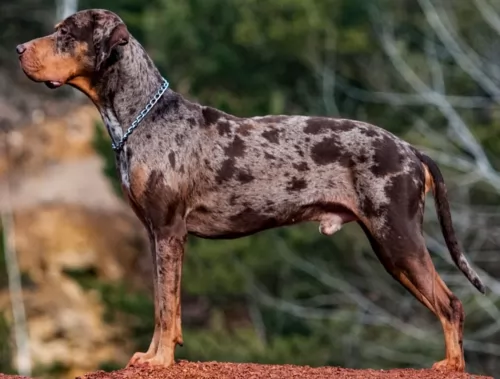 Catahoula dogs are the kind of dogs that make perfect family pets as they are all rounders. They’ve got characteristics that everybody wants in a dog. They are naturally protective, even they are not described as aggressive dogs. With training and socialization they get on well with children as well as other pets in the home. He is alert and territorial, which makes him a good watchdog, more so because he doesn’t particularly like strangers.
Catahoula dogs are the kind of dogs that make perfect family pets as they are all rounders. They’ve got characteristics that everybody wants in a dog. They are naturally protective, even they are not described as aggressive dogs. With training and socialization they get on well with children as well as other pets in the home. He is alert and territorial, which makes him a good watchdog, more so because he doesn’t particularly like strangers.
Intelligent and independent, training makes him wonderfully obedient and relaxed. However, give him the chance for ball games and a walk, and he is more than ready.
He is used to being a guard- and hunting dog, and this makes him an active, energetic dog. You will need to give him plenty of activities if you don’t want this amicable dog becoming anxious, frustrated and destructive.
Exercise him well, provide him with nourishing, top quality food together with fresh water and shower him with the love and attention he deserves as a family member. You’ll also join the ranks of Catahoula Cur owners who want to tell others about what an awesome pet he makes.
 The Pugalier gets his characteristics from both the popular parent breeds he comes from – the Pug and the Cavalier King Charles Spaniel.
The Pugalier gets his characteristics from both the popular parent breeds he comes from – the Pug and the Cavalier King Charles Spaniel.
Both these dog breeds are immensely popular, friendly, loving and amusingly entertaining. He is an excellent dog choice for the first time dog owner.
The Pugalier is an intelligent dog breed and easy to train too. When you bring such a sweet dog into your home, you open the doors to a deep, meaningful friendship and loyalty from your canine pet.
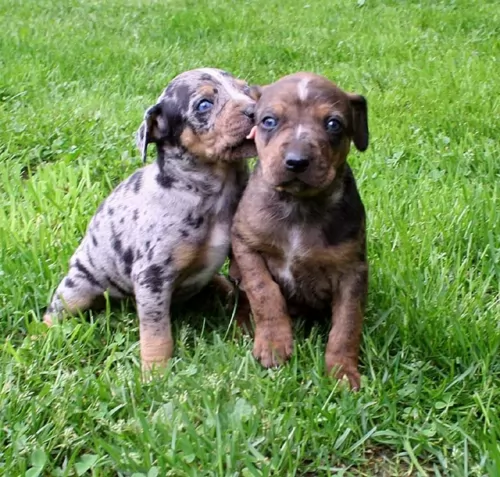 When you buy a Catahoula Cur, you can know that your pet is going to be fairly healthy, however there will be some common health issues to look out for, and by knowing about these health concerns, you can be better prepared.
When you buy a Catahoula Cur, you can know that your pet is going to be fairly healthy, however there will be some common health issues to look out for, and by knowing about these health concerns, you can be better prepared.
Your Catahoula Cur will be susceptible to some bacterial and viral infections which can be life threatening for him if he gets them. Some of these are parvo, distemper and rabies. That is why it is important to have your pet vaccinated, which can start at about 8 weeks of age for a puppy.
Obesity is a world-wide problem with humans and with their pets and it can open up a whole lot of problems with your pet’s health that he otherwise might not have got. It can play havoc with your pet’s digestion, and it can cause joint problems too.
It can be so tempting to pop a sweet treat into your pet’s mouth because you love him so much, but get to know what foods can actually be hazardous for him.
 Less wrinkles and a longer snout make the Pugalier a healthier dog than the purebred Pug. The dog, when well cared for, can still reach a good age of 14 or so years.
Less wrinkles and a longer snout make the Pugalier a healthier dog than the purebred Pug. The dog, when well cared for, can still reach a good age of 14 or so years.
Eye problems can still be a problem as both the Pug and the Cavalier have protruding eyes.
Patellar Luxation is another health issue to watch for. The patella or the kneecap is dislocated and the dog will have difficulty with putting weight on the leg. Your vet may perform surgery on your dog and the prognosis is very good if arthritis hasn’t already developed.
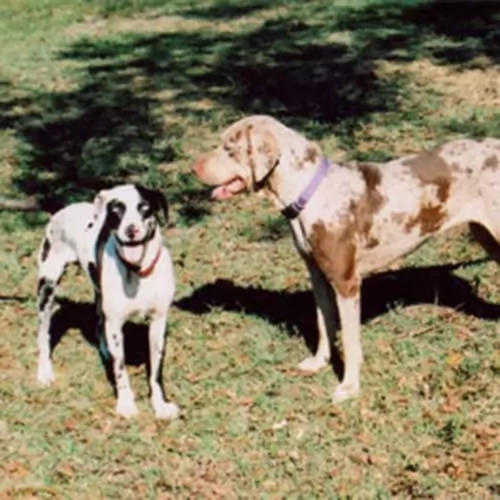 Your Catahoula Cur isn’t a high maintenance dog and a good brushing 2 times a week will keep his leopard coat looking shiny and free of loose hairs.
Your Catahoula Cur isn’t a high maintenance dog and a good brushing 2 times a week will keep his leopard coat looking shiny and free of loose hairs.
Catahoula’s have good teeth, and you want to keep them that way by brushing them at least 2 or 3 times a week to prevent dental decay and a host of other medical issues.
 Your Pugalier will require daily exercise, and he will just love a walk. The Pug part of him will tell you to go slowly with exercise and to ensure it isn’t too strenuous.
Your Pugalier will require daily exercise, and he will just love a walk. The Pug part of him will tell you to go slowly with exercise and to ensure it isn’t too strenuous.
The Spaniel part of him will love a robust ball game or running backwards and forwards between two people throwing a frisbee. Watch the Pugalier during exercise and don’t allow him to get overly hot and bothered.
Pugaliers do shed hair and you will need to brush him twice a week. Check his eyes and inside his ears and make sure all is as it should be.
Trim his nails and look inside his mouth for bad teeth. Dog’s can’t tell you they’re in pain and bad teeth can cause terrible pain and a lot of health issues throughout the entire body.
Every dog needs an excellent diet if he is to ward off illness and live a long life.
There are some excellent commercially manufactured dog foods on the market so read the packaging carefully and avoid those ones with low quality ingredients like colorants, lots of preservatives and fillers.
High quality dry kibble can be made more inviting when you add in some home-cooked food twice a week. Boiled chicken, sweet potatoes, brown rice or pasta, carrots and spinach will be excellent for him – it is simple and nutritious.
Chop the food up finely and add it into the dry kibble. Also, your little pet will thrive on some raw meat occasionally too as this keeps the coat shiny and and the skin free of infections. Make sure he is never without a constant supply of fresh, cool water.